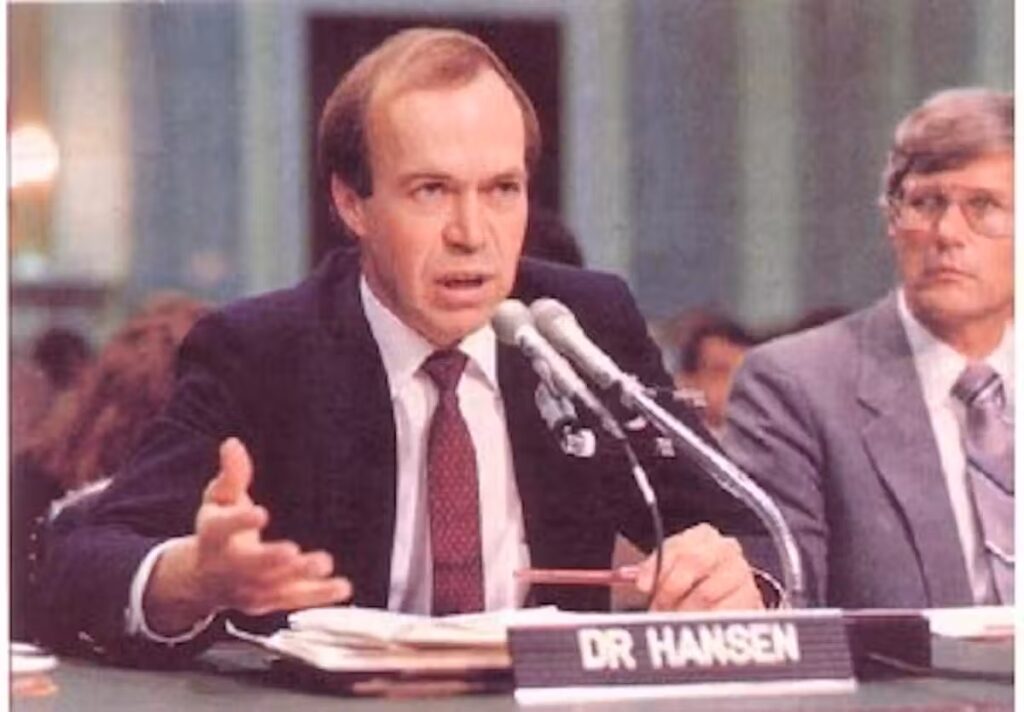Why We Delayed Climate Action For So Long…
Nov 14, 2023 | Pratirodh Bureau
Many people first took notice of climate change after US scientist James Hansen testified about its effects (Image: NASA)
We now have a very narrow window to significantly and rapidly slash greenhouse gas emissions to avoid the most disastrous effects of climate change, with just an estimated six years left before we blow our carbon budget to stay below 1.5°C of warming.
We’ve known how gases like carbon dioxide trap heat for over 100 years and alarm bells have been ringing loudly for over 35 years, when climate scientist James Hansen testified that global warming had begun.
As extreme weather and temperatures arrive, many of us wonder whether it had to get this bad before we acted. Did we need to see to believe? What role has our own psychology played in our sluggishness?
How Do We Respond To Threats?
From a psychology point of view, motivating us to take action on climate is a wicked problem. Many factors combine to make it harder for us to act.
The necessary policies and behaviour changes have been viewed as too hard or costly. Until recently, the consequences of doing nothing have been seen as a distant problem. Given the complexity of climate modelling, it has been difficult for scientists and policymakers to lay out what the specific environmental consequences would be from any given action or when they would manifest.
As if that’s not enough, climate change presents a collective-action problem. It would do little good for Australia to reach net-zero emissions if other countries keep emitting without change.
When we write about climate change, we often frame it as an ever more urgent and significant threat to our way of life. We do this thinking that showing the seriousness of the threat will galvanise others into faster action.
Unfortunately, this isn’t always the case. When we’re confronted with big risks – and the need for a painful shift from the status quo – some of us respond unexpectedly. We might find ourselves motivated to seek out evidence to undercut the reality of the threat, and use this uncertainty to justify staying on the same path.
One unfortunate aspect of this is that people motivated to avoid or deny climate risk are actually better able to do so when they have more scientific training. This background equips them better to counter-argue and rationalise the dissonance, meaning they seek out information to align with their beliefs and justify their passivity. Misinformation and doubt are particularly damaging to climate action. They let us feel OK about inaction.
This tendency to rationalise away risk was also clearly visible among people who downplayed the impact or even denied the existence of COVID-19.
Is there an antidote?
We’ve found explaining the simple and well-understood way that emissions of specific gases trap the Sun’s heat and warm the planet can be effective, because people can’t rationalise these facts away. The greenhouse effect is a well-accepted phenomenon, even by those most sceptical of global warming. After all, it’s essential to life on Earth – without these gases trapping heat, the world would be too cold for life.
Why Are We Finally Acting?
As climate change has moved out of the computer models and become very much a part of our present, we are seeing stronger efforts to cut emissions.
More and more of us are experiencing tangible events such as forest fires, droughts, sudden floods, rapidly intensifying hurricanes or record-breaking heatwaves. This has removed one barrier to inaction. Until now, the consequences of doing nothing seemed far off and uncertain. Now they are seen as certain and already present.
Better still, technological advancement and economies of scale in production have meant clean energy and clean transport have fallen significantly in price.
At government and individual levels, there are now measures we can take that aren’t too costly and come with immediate gains such as cutting power bills or avoiding petrol price increases. Greater political consensus in many countries is also helping challenge the inertia of the status quo. That’s another barrier to action evaporating.
As climate damage gets worse, we’re likely to see ever-starker warnings. Does fear motivate us? When faced with threats, we are more likely to take action, particularly if we think we can make a difference.
For years, our own psychology slowed down efforts to make the sweeping changes necessary to quit fossil fuels. Now, at least, some of these psychological barriers are getting smaller.
(Published under Creative Commons from The Conversation. Read the original article here)
